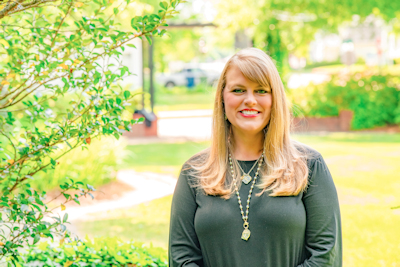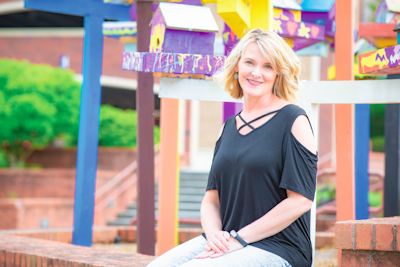It was Jan. 20, 2022, and Leanne Puckett was racing to pick up her mother at home.
Her father had been hospitalized days earlier with COVID-19. Early reports from his nurses at Tanner Medical Center/Carrollton seemed promising, but things had taken a turn for the worst. The family needed to come to the hospital. Decisions had to be made.
 “Mama was terrified,” she said. “We all were. We weren’t allowed to see him because he was in isolation, but every time we’d call the hospital, it sounded like he was doing OK. Then he just got worse, real fast. We weren’t prepared for that.”
“Mama was terrified,” she said. “We all were. We weren’t allowed to see him because he was in isolation, but every time we’d call the hospital, it sounded like he was doing OK. Then he just got worse, real fast. We weren’t prepared for that.”
Together at the hospital, the family agreed her father would go on a vent. It was his only chance. But the decision had to be made quickly, not only because of the urgency of her father’s declining health, but because it was almost time to pick Puckett’s seventh-grade daughter up from Carrollton Junior High.
About a week later, her father had improved enough to come off the vent, but the virus had wrecked his body and mind. He was sometimes combative, sometimes confused. Someone from the family needed to sit with him around-the-clock.
Puckett faced a grueling routine, dropping her daughter, Marlow, off at school, going to the hospital and sitting with her dad until it was time to pick Marlow up. Wake, car rider line, caregiver, car rider line, repeat.
“The thing was, the rest of life didn’t stop,” said Puckett. “I still had to get Marlow to school. We still had to make lunches and meals; we still had homework. Everything outside of the hospital was going on like usual, and in the hospital, it was like we were just stuck.”
Puckett wasn’t alone in her vigil. Her mother sat with him, too, as did her husband, Ty, and her brother and sister-in-law when they were in town.
It was a small example of an ever more common situation for many women: an obligated parent, and also a dutiful daughter, niece, daughter-in-law or other loved one to an aging person.
Patience, persistence and peace
Beth Sims gives thanks that she’s as fortunate as she is in caring for her parents and her daughter, Briley.
 But somewhere between daily visits to check on her dad with Parkinson’s and stepmother with her own health concerns and keeping up with everything that goes with a child’s senior year of high school, the Burwell hairdresser looks for ways to take care of herself.
But somewhere between daily visits to check on her dad with Parkinson’s and stepmother with her own health concerns and keeping up with everything that goes with a child’s senior year of high school, the Burwell hairdresser looks for ways to take care of herself.
“I love just getting outside, planting flowers and gardening — and I just picked up a few canvasses, so I’m starting to paint again,” said Sims. “And I always have a project going — I’m a fixer.”
Like Puckett, Sims isn’t alone in being a caregiver. Her husband, Bart, is always willing to help when he’s not out of town for work, as is her son. Her brother, too, has been a great help.
When it comes to taking care of her parents, Sims focuses on taking things one day at a time.
“That’s how it is with Parkinson’s,” she said. “There’s good days and bad days. You never know from one day to the next how he might be. We’re trying to keep him as mobile as possible. Let him enjoy his garden again, that sort of thing.”
A common strain
The American Psychological Association’s Stress in America survey found a huge share of those in the “sandwich generation,” between 35 to 54 years of age, report feeling more acute levels of stress than other age groups as they balance life between caring for their children and their aging loved ones.
Of that group, women report feeling more stressed and overextended than men — and less healthy ways of coping with that stress.
“It’s not surprising — traditionally, women bear a greater load of the caregiving responsibilities,” said Tiffani Fryar, LPC, a licensed professional counselor with Willowbrooke Counseling Center. “Being a parent is stressful. Being a caregiver to an aging person is stressful. Being both is extremely hard.”
Fryar said it’s vital for women in the sandwich generation to focus on themselves from time to time — which, admittedly, is easier said than done.
“You’re already stretched thin,” said Fryar. “Imagine the compounded level of stress, though, if anything happens to you. To take care of everyone, you’ve got to keep yourself up, too.”
Distractions like Sims’ painting and gardening are perfect ways to carry the weight of caregiving, Fryar said. For Puckett, the gym and church are her healthy outlets. Both women rely heavily on their faith.
“I’ve had peace, because I know, ultimately it’s all in God’s hands,” said Puckett.
“You have to trust in the Lord,” agreed Sims. “Use lots of self-talk and prayer. Keep telling yourself that good times are coming.”
Fryar also cautions that, when it comes to managing stress, mothers are very often the role models for the rest of their household.
“You set the expectations for how one should respond to stress through your own behaviors,” said Fryar. “The way you cope will seem a natural way for your children to cope, too. And one day, those kids are going to be taking care of you the way you’re taking care of aging relatives, so remember that healthy coping strategies run in families.”
A privilege to care
Along with their strong faith, Puckett and Sims also make clear that they don’t consider their role as dual caregivers to be a burden at all.
“I’m so lucky that I’m able to be there for them,” said Sims. “I’m glad to do what I can for them. My dad likes to eat, so I get to cook for him. He’s always been there for us; now I get to be there for them.”
“I consider it an honor,” said Puckett. “I don’t mind doing anything I can for them. The Bible says, ‘honor thy father and thy mother,’ and this is how I can do that.”
Both women try to stop by their parents’ homes daily and often find some little chore or task they can help with.
Puckett’s dad was discharged from the hospital on Feb. 2, and after a brief stay at a rehab facility to help him recover his strength a little, he’s finally home, where Puckett and her family can better help him.
“It’s better to keep up than to catch up,” said Puckett. “It’s easier now that Daddy’s home. Mama is doing all she can, but she needs help. There are doctor’s visits, little chores around the house — but that’s what we’re here for.”
Sims also takes her parents to frequent doctor visits and prepares meals, neither of which she minds.
“I’m glad we live so close,” she said. “It makes it easier to check in on them, to be a help. I like that I can be a help.”
Healthy strategies for caregivers
The team at Willowbrooke Counseling Center offers advice for “sandwiched” women.
- Set your priorities. It isn’t necessary to do it all, all the time. Delegate as you can, ask for help and learn to let go of the things that aren’t as important.
- What are your stressors? Things bother us in different ways. Is it finances that stress you out? A loved one’s health? Work? Your relationship with your loved ones? Know your triggers so you can see them coming.
- Take care of yourself. You can’t help others if you can’t help yourself. Focus on your diet, try to get exercise, keep up with your own doctor’s appointments and screenings — if you don’t do that for yourself, who will do it for them?
- Develop healthy ways to cope. Take a walk. Talk to friends. Enjoy a hobby. Talk things through with a partner. Focus on healthy behaviors that make you feel better about yourself and what you’re going through.
- Get professional help if you need it. A mental health professional can be an invaluable source of support in helping you work through issues with family dynamics, romantic relationships, grief and more. Don’t be afraid to get help.
Need help? Find it at WillowbrookeAtTanner.org.